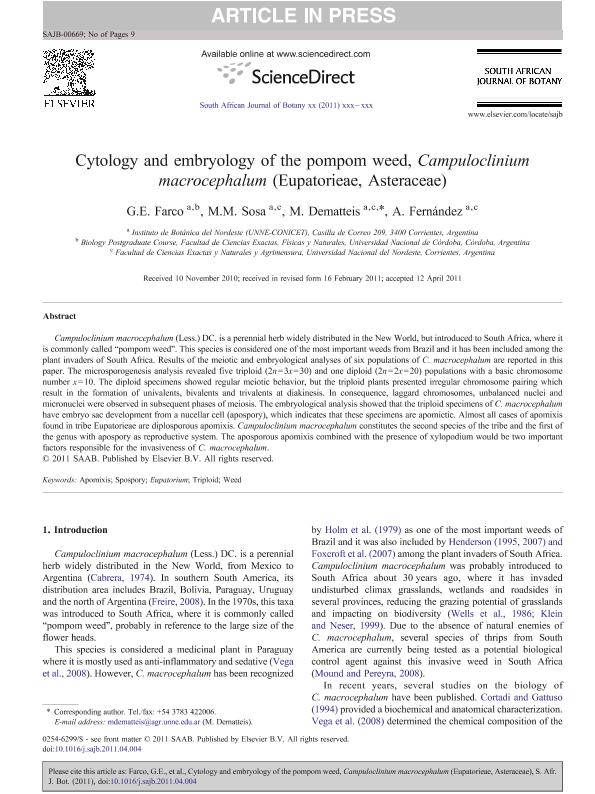Artículo
Cytology and embryology of the pompom weed, Campuloclinium macrocephalum (Eupatorieae, Asteraceae)
Farco, Gabriela Elizabeth ; Sosa, Maria de Las Mercedes
; Sosa, Maria de Las Mercedes ; Dematteis, Massimiliano
; Dematteis, Massimiliano ; Fernandez, Aveliano
; Fernandez, Aveliano
 ; Sosa, Maria de Las Mercedes
; Sosa, Maria de Las Mercedes ; Dematteis, Massimiliano
; Dematteis, Massimiliano ; Fernandez, Aveliano
; Fernandez, Aveliano
Fecha de publicación:
01/2012
Editorial:
Elsevier Science
Revista:
South African Journal Of Botany
ISSN:
0254-6299
Idioma:
Inglés
Tipo de recurso:
Artículo publicado
Clasificación temática:
Resumen
Campuloclinium macrocephalum (Less.) DC. is a perennial herb widely distributed in the New World, but introduced to South Africa, where it is commonly called “pompom weed”. This species is considered one of the most important weeds from Brazil and it has been included among the plant invaders of South Africa. Results of the meiotic and embryological analyses of six populations of C. macrocephalum are reported in this paper. The microsporogenesis analysis revealed five triploid (2n= 3x= 30) and one diploid (2n= 2x= 20) populations with a basic chromosome number x= 10. The diploid specimens showed regular meiotic behavior, but the triploid plants presented irregular chromosome pairing which result in the formation of univalents, bivalents and trivalents at diakinesis. In consequence, laggard chromosomes, unbalanced nuclei and micronuclei were observed in subsequent phases of meiosis. The embryological analysis showed that the triploid specimens of C. macrocephalum have embryo sac development from a nucellar cell (apospory), which indicates that these specimens are apomictic. Almost all cases of apomixis found in tribe Eupatorieae are diplosporous apomixis. Campuloclinium macrocephalum constitutes the second species of the tribe and the first of the genus with apospory as reproductive system. The aposporous apomixis combined with the presence of xylopodium would be two important factors responsible for the invasiveness of C. macrocephalum. © 2011 SAAB. Published by Elsevier B.V. All rights reserved.
Palabras clave:
Apomixis
,
Spospory
,
Eupatorium
,
Triploid
,
Weed
Archivos asociados
Licencia
Identificadores
Colecciones
Articulos(CCT - CORDOBA)
Articulos de CTRO.CIENTIFICO TECNOL.CONICET - CORDOBA
Articulos de CTRO.CIENTIFICO TECNOL.CONICET - CORDOBA
Articulos(CCT - NORDESTE)
Articulos de CTRO.CIENTIFICO TECNOL.CONICET - NORDESTE
Articulos de CTRO.CIENTIFICO TECNOL.CONICET - NORDESTE
Articulos(IBONE)
Articulos de INST.DE BOTANICA DEL NORDESTE (I)
Articulos de INST.DE BOTANICA DEL NORDESTE (I)
Citación
Farco, Gabriela Elizabeth; Sosa, Maria de Las Mercedes; Dematteis, Massimiliano; Fernandez, Aveliano; Cytology and embryology of the pompom weed, Campuloclinium macrocephalum (Eupatorieae, Asteraceae); Elsevier Science; South African Journal Of Botany; 78; 1-2012; 21-29
Compartir
Altmétricas



